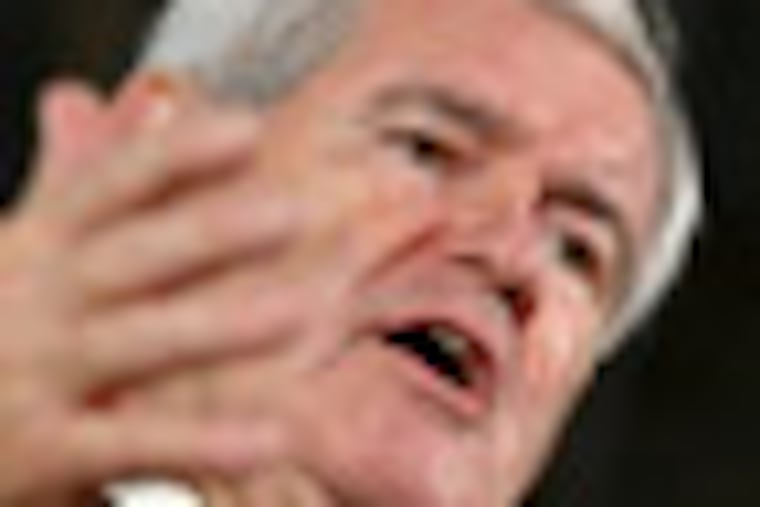PhillyDeals: Pennsylvania is not Gingrich country, a GOP money man says
Can former U.S. House Speaker Newt Gingrich - raised near Harrisburg, bearing a classic Pennsylvania German family name, newly converted to the Catholic Church many Pennsylvanians cling to - count on Keystone State backing for his presidential run?

Can former U.S. House Speaker Newt Gingrich - raised near Harrisburg, bearing a classic Pennsylvania German family name, newly converted to the Catholic Church many Pennsylvanians cling to - count on Keystone State backing for his presidential run?
Not among the party's Philadelphia money men, said John Soroko, chairman at law firm Duane Morris L.L.P. and a confidant of successful conservative Republicans such as U.S. Sen. Pat Toomey (R., Pa.).
"This is not a Gingrich town," whatever family, school, and congressional ties the candidate may try to conjure upstate, Soroko said.
While others here, including apartment mogul and national GOP fund-raiser Mitch Morgan, have lined up with Mitt Romney as the most electable candidate, Soroko hasn't committed yet.
Doesn't the Republican free-for-all make Obama more reelectable - since you can't beat Somebody with Nobody?
Wrong, said Soroko: Any Republican will pick up disillusioned Obama 2008 voters. That includes nervous six-figure-income professionals who feel the president has casually lumped them in with the demon rich who ought to be paying higher taxes - like the Philadelphia-area voters who elected Democrats to Congress with Obama in 2008 but went GOP in 2010.
Soroko closed with a free-market argument: "With competition, you always get a superior product."
Squeezed
Bank bosses - Jim Rohr at PNC, Mark Turner at WSFS - tell me they want to lend more to small businesses, but they cannot find good borrowers; too many owners are still trying to cut debt and reduce their risks, instead of growing and hiring and betting on the future.
"I don't buy the theory," said Ami Kassar, the former Advanta Corp. manager who runs small-business loan adviser Multifunding L.L.C. in Broad Axe, Montgomery County.
Kassar said his five-person firm, which is paid to match borrowers and lenders for loans under $1 million, is on track to close "over 50 loans, with [total] balances over $30 million," up from four loans for $3 million the year before.
Kassar said a shortage of bank lenders willing to close deals under $1 million, at market interest rates in the low to middle single digits, has driven too many sound businesses to "factoring, accounts-receivable financing, hedge funds, and asset-based loans" typically charging 15 percent to 40 percent.
Why? Pressed by federal bank examiners hoping to slow the surge in small-bank failures, "the banks want three things: cash flow, collateral, and credit. When they can find all three, they'll fight to do those loans," Kassar acknowledged.
But many small service and tech companies lack collateral because they typically don't own buildings, valuable machines, or easy-to-sell inventory. So banks, like credit card borrowers or subprime home borrowers back in the bubble years, are "forced onto this high-interest-rate treadmill. There is plenty of money available - at the higher interest rates."
It's clear big banks are lending less to small companies. Checking quarterly call reports ("Reports of Condition and Income," view them at www.fdic.gov), Kassar found that, among the banks that control 80 percent of the U.S. market, total deposits "have gone up from $5.7 trillion in 2007, to $7.5 trillion this year," but small-business loans by the same group of lenders (many of them newly merged) have fallen to $309 billion, from $400 billion four years ago.
As Kassar put it, "It's easier to lend AT&T a killion dollars to buy T-Mobile than to make a million small-business loans. But that's what the economy needs to recover."
What, if anything, can government do to make small-business lending more attractive?
"The government ought to encourage bank examiners to look at the ratio of small-business loans" to big banks' total business, and push federally insured banks that are doing less than their share to lend more to jobs-producing small and midsize firms, instead of just plowing it into government securities, mergers, and big corporate loans, Kassar said.